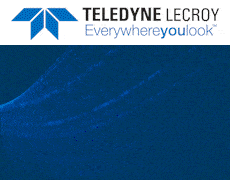Lightbits Labs: SuperSSD, Scalable From 64TB to 1PB, Ethernet-Attached SSD 2U Rack Solution
Supporting up to 5 million 4K IO/s, latency consistency of less than 200us with end-to-end NVMe, and dual 100GbE wire-speed performance
This is a Press Release edited by StorageNewsletter.com on April 29, 2019 at 2:28 pmLightbits Labs introduced SuperSSD, a scalable Ethernet-attached SSD solution that addresses the storage speed, capacity and reliability needs of AI and ML training systems.
SuperSSD makes storage transparent, so applications like high-speed databases, high performance analytics and customer engagement applications can deliver optimal user experiences.
Click to enlarge
This latest solution from the company that championed the NVMe/TCP standard, is purpose-built for fast and massive parallel access to data. The appliance is designed to support the scale, performance and HA needs of enterprises undergoing resource intensive digital transformation.
AI and ML are prime examples of applications that historically relied on locally-stored data on DAS with SSDs. However, as their data sets scaled to a massive size on distributed resources, DAS solutions become ineffective, complex to manage, costly, and potentially at risk of being a single point of failure. These growing needs for scale, performance and distributed access require a new type of storage system designed for fast and massive parallel access to data.
By virtualizing and managing a large pool of NVMe SSDs with a global flash translation layer (GFTL), SuperSSD ensures efficient storage utilization and wire-speed access to large data sets. Deployed using existing network and compute infrastructures, it is seamless to install, allowing data scientists to scale their storage reach and performance when and where they need it.
Click to enlarge
As a plug-and-play appliance, SuperSSD offers variety of benefits around simplicity, performance, fault tolerance and cost efficiencies, including following:
-
High capacity: Scalable from 64TB to 1PB usable capacity (field upgradeable) that can be shared across multiple compute nodes.
-
Performance: Supporting up to five million 4K IO/s and with a latency consistency of less than 200us with end-to-end NVMe
-
Connectivity: Dual 100GbE wire-speed performance
-
Compression: 4X data reduction or greater at line rate, increasing usable storage capacity while enhancing SSD endurance and accelerating write-intensive applications.
-
Fault tolerant: Elastic Erasure Coding (EC) isolates SSD failures, ensuring data protection and no service interruption.
-
Offload application server: Fully offloads all the storage tasks from the application server.
-
Computational storage: Provides in-storage processing so that user-defined functions can run in the storage server to maximize storage bandwidth and improve application performance.
-
NVMe/TCP simplicity: Uses standard TCP/IP network infrastructure for shared storage supporting many applications and compute nodes.
-
Form factor: 2U standard rack server with simple plug-and-play installation
Click to enlarge
“Accessing massive amounts of data with low latency is a priority for deep learning, artificial intelligence and high performance analytics workloads,” said Roger Peene, VP, product planning and strategy, storage business unit, Micron Technology, Inc. “Solutions like Lightbits Labs’ SuperSSD can enable customers to access large data sets with rich data services in a low-latency, disaggregated infrastructure solution.“
“Solutions built around the speed and efficiency of NVMe over TCP offer frictionless disaggregation for companies needing scalable storage. Based on our deep familiarity with the founding team and their outstanding track record, Dell Technologies Capital is excited to be an investor supporting Lightbits Labs,” said Yair Snir, VP and MD, Dell Technologies Capital.
“We expect data-intensive applications such as AI and machine learning to drive increased use of high-performance storage to ingest and process the associated large data sets,” said Dennis Hahn, senior analyst, cloud and data center research practice, IHS Markit. “In our recent DC Storage Strategies Survey, respondents indicated they are seeking choices and options in the way they deploy their storage solutions. Clearly, enterprises see the need for high performance and low-latency storage that is scalable and easily accessible for applications, where storage is accessed without the need for server software additions.“
“Although it is rarely the center of the story, storage is a key infrastructure element that enables AI and machine learning,” said Avigdor Willenz, founder and chairman board of directors, Lightbits Labs. “By making fast and massive access to data available everywhere and much simpler from start to finish, Lightbits’ SuperSSD enters the AI market as a true storage and data infrastructure game changer.“
“AI and machine learning are exceedingly resource intensive, involving access to distributed devices and massive amounts of data,” said Eran Kirzner, CEO and co-founder, Lightbits Labs. “As the amount of data analyzed increases, DAS solutions become completely ineffective, complex to manage, costly and potentially a single point of failure. By ensuring zero downtime, SuperSSD is the only storage solution that can support continuous AI and machine learning processes, reliably, cost-effectively, and with high-performance and simplicity.“
The SuperSSD appliance is available for purchase, along with the two NVMe/TCP solutions Lightbits introduced last month: LightOS software and the LightField storage acceleration card.
Click to enlarge
Resources:
Video: Meet Lightbits: Separation without Drama
Video: Lightbits Demo at Flash Memory Summit 2018
LightOS and LightField announcement (press release)
Read also:
$50 million in Funding for Lightbits Labs, in NVMe/TCP Standard
Investors include Dell EMC, Cisco and Micron
March 13, 2019 | Press Release
FMS: Lightbits Labs Demonstrated Hyperscale Storage Platform for NVMe OverTCP
To replace iSCSI protocol as communication standard between compute servers and storage servers and become default protocol for disaggregated storage
August 17, 2018 | Press Release








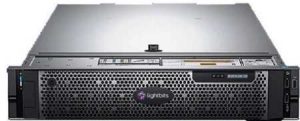
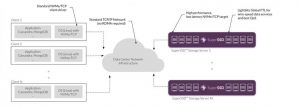
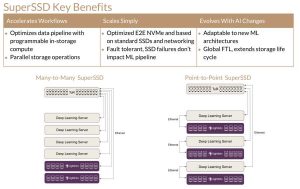

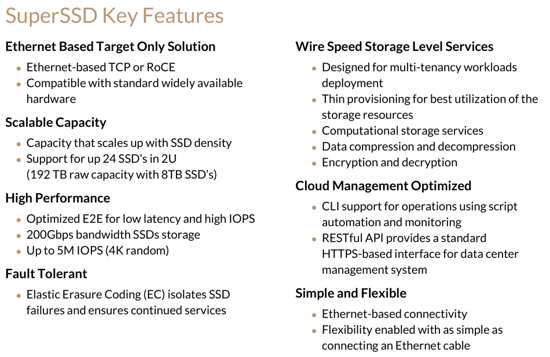






 Subscribe to our free daily newsletter
Subscribe to our free daily newsletter


